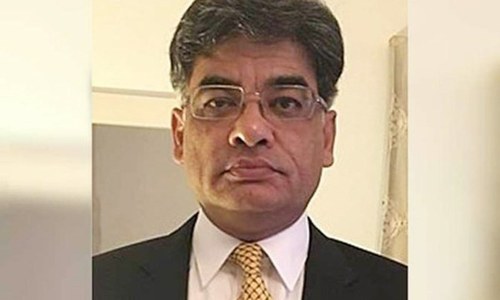ISLAMABAD: A Supreme Court judge wondered if the institution of Advocate-on-Record (AoR) has outlived its utility for causing more disservice to litigants as well as the court itself than achieving the benefits like early disposal of cases.
“Whether the institution of AoR is required anymore?” asked Justice Syed Mansoor Ali Shah in a judgement. He also wondered whether this institution has outlived its utility and was causing more disservice to the litigants and the court than achieving the benefits of this institution.
According to Order 1, Rule 2 of the Supreme Court Rules, 1980, AoR is an advocate who is entitled to act in the Supreme Court by pleading for a party — an appellant, respondent, plaintiff, defendant, etc.
The rules suggest that a senior advocate or AoR is entitled to appear and plead before the Supreme Court on signing his respective Roll. And no advocate can appear or plead in any matter unless he is instructed by the AoR; besides, every AoR before acting on behalf of any person or party will file in the court registry a power of attorney in the prescribed form authorising him to act.
Purpose behind the institution is to achieve timely disposal of cases
In the judgement, Justice Shah observed that the concept of enrolling AoRs at the Supreme Court, as the rules signify, was to ensure that the cases filed in the court were handled professionally by certain designated lawyers called the AoRs.
This ensures proper management of cases, timely service of court-process to parties and certainty of representation before the court, leaving no margin for adjournments as is in other courts. The purpose behind this is to achieve timely decisions of cases by the apex court, the judgement explained.
The issue cropped up on Oct 10, 2021, when a two-judge Supreme Court bench consisting of Justice Shah and Justice Qazi Mohammad Amin Ahmed took up an appeal moved by the Commissioner Inland Revenue-Multan against the Feb 11, 2020, Multan Bench-Lahore High Court judgement.
When the case was called, none appeared before the bench on behalf of the petitioner, though there was a written request for adjournment by the AoR for petitioner Syed Rifaqat Hussain Shah.
Consequently, the court sent for the AoR in the case, who appeared later in the day, but was asked to address the court on the question of limitation since the petition for leave to appeal before this court was barred by time and the application for condonation of the delay was without any sufficient reason.
But the AoR, instead of arguing the application, surprised the court by submitting without any “remorse” that he was not aware of the application, though it was signed and filed by him and did not even have the file of the case, with him, Justice Shah noted.
The court then was constrained to remind the AoR of his responsibilities to his client and the court under the relevant Supreme Court Rules, 1980.
The rules, so referred clearly showed that the principal responsibility under the law to act, appear and plead on behalf of the party is that of the AoR, the judgement said, adding that it was the AoR who engages the senior Supreme Court lawyer and that it was on his instructions the counsel pleads the case of the party before the court.
Engagement of the counsel, the judgment explained, did not absolve the AoR of his primary responsibility to attend to the case on behalf of the party before the apex court and in case the counsel was not available, it is the responsibility of the AoR to appear and plead the case of the party.
It is, of course, the discretion of the court to grant adjournment in any particular case if the counsel is not available, considering the nature and complexity of the case, the judgement said, adding that it does not relieve the AoR of his responsibility under the rules to be fully prepared to act, appear and plead the case of the party irrespective of whether the counsel was present or not.
In the present case, the AoR did not even find it appropriate to appear before the court after having submitted a written application for adjournment on behalf of the counsel and when he appeared a simple question was asked by the court to justify whether condonation of the delay in filing the petition for leave to appeal can be granted on the ground agitated in the application, the judgement said.
But the response of the AoR was that he does not even have the file of the case, the judgement regretted, adding that it was important to draw the attention of the AoR to Rules 30 and 31, under which such behaviour may render the AoR liable for misconduct, leading to disciplinary action against him, including suspension of his licence and removal from the practice of the court. Therefore, the AoR ought to have taken his responsibility seriously, the judgement emphasised.
Consequently, the court rejected the appeal for being barred by time and observed that since the AoR did not render any assistance or made any other submission, the application for condonation of the delay was found to be meritless and therefore dismissed.
Published in Dawn, October 25th, 2021



































